Lcd companion boards support (VKLCD50RTA & VKLCD70RT)
What is this ?
This is a demo program using Renesas RGA library & USB Camera to demonstrate VK-RZ/A1H's companion boards workability.
Supported companion Boards:
VKLCD50RTA
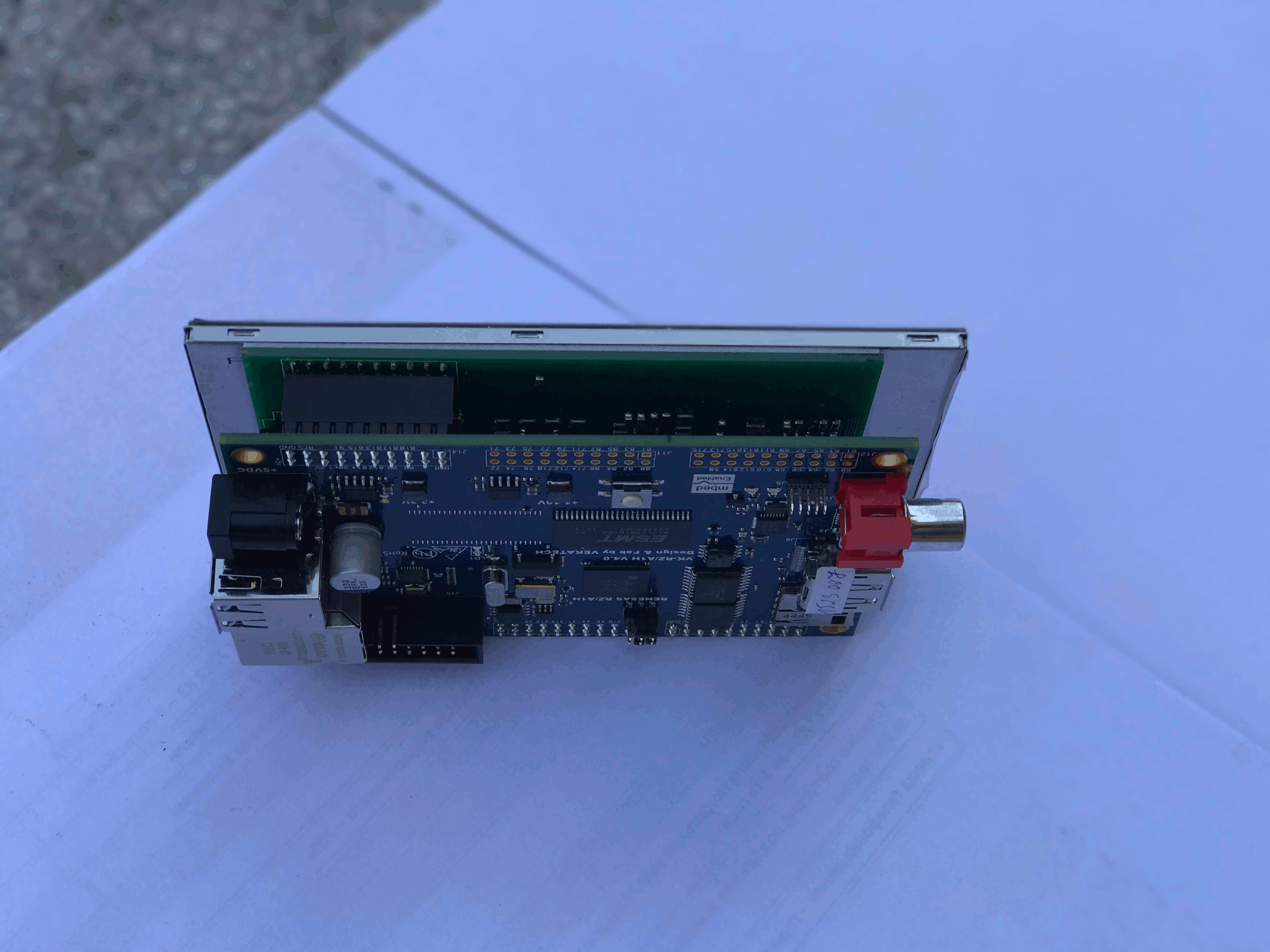
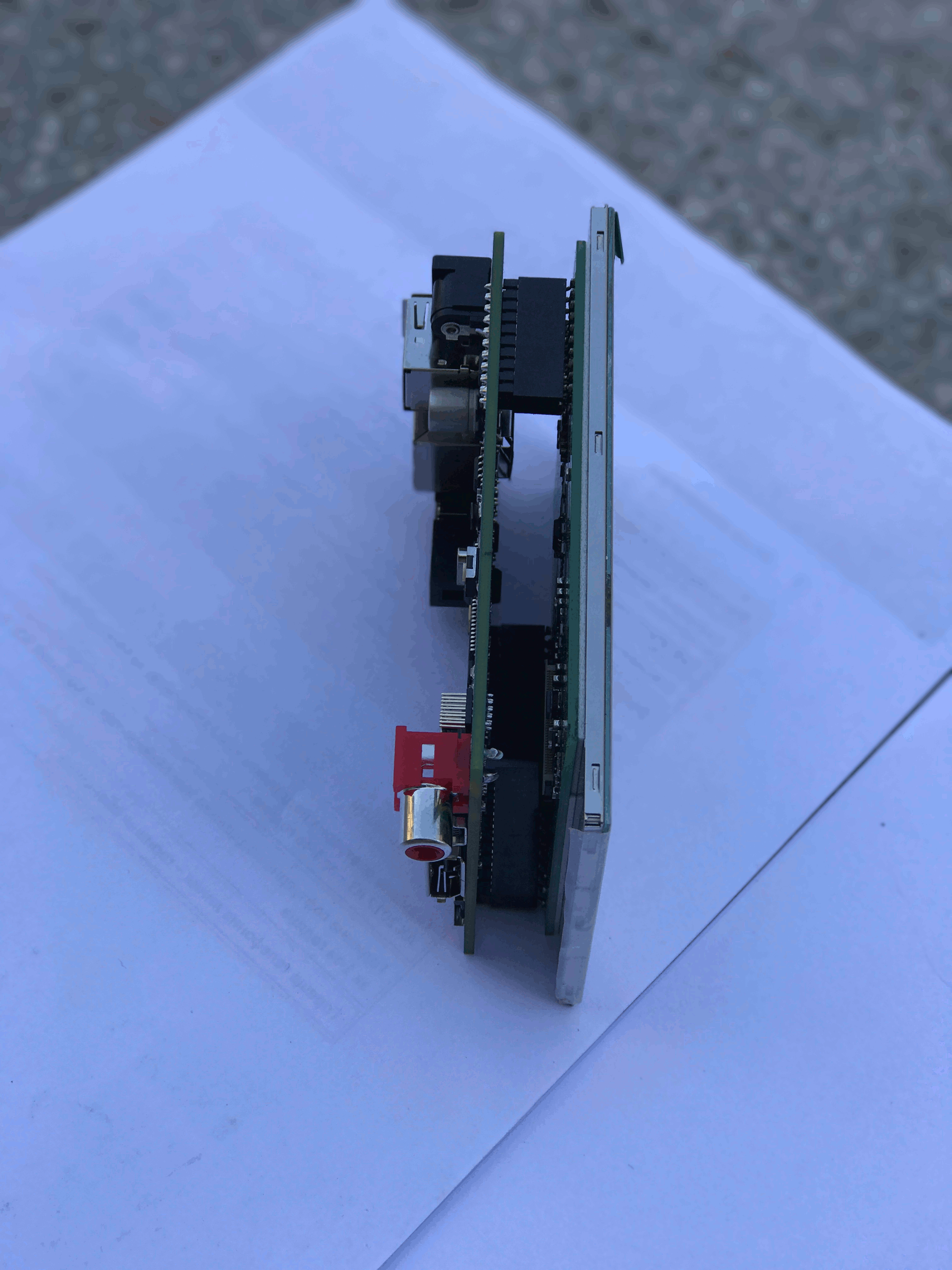
VKLCD70RT
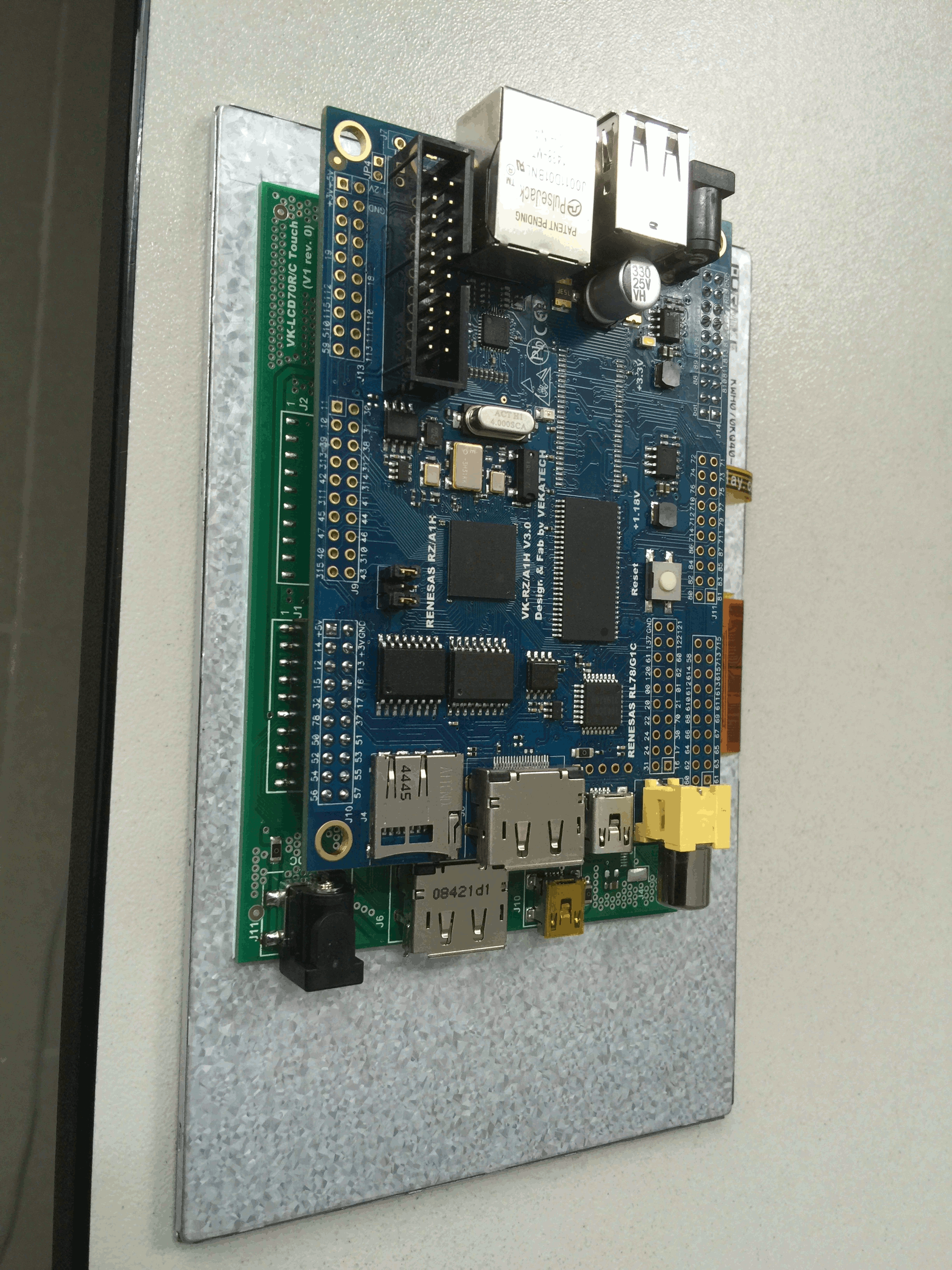
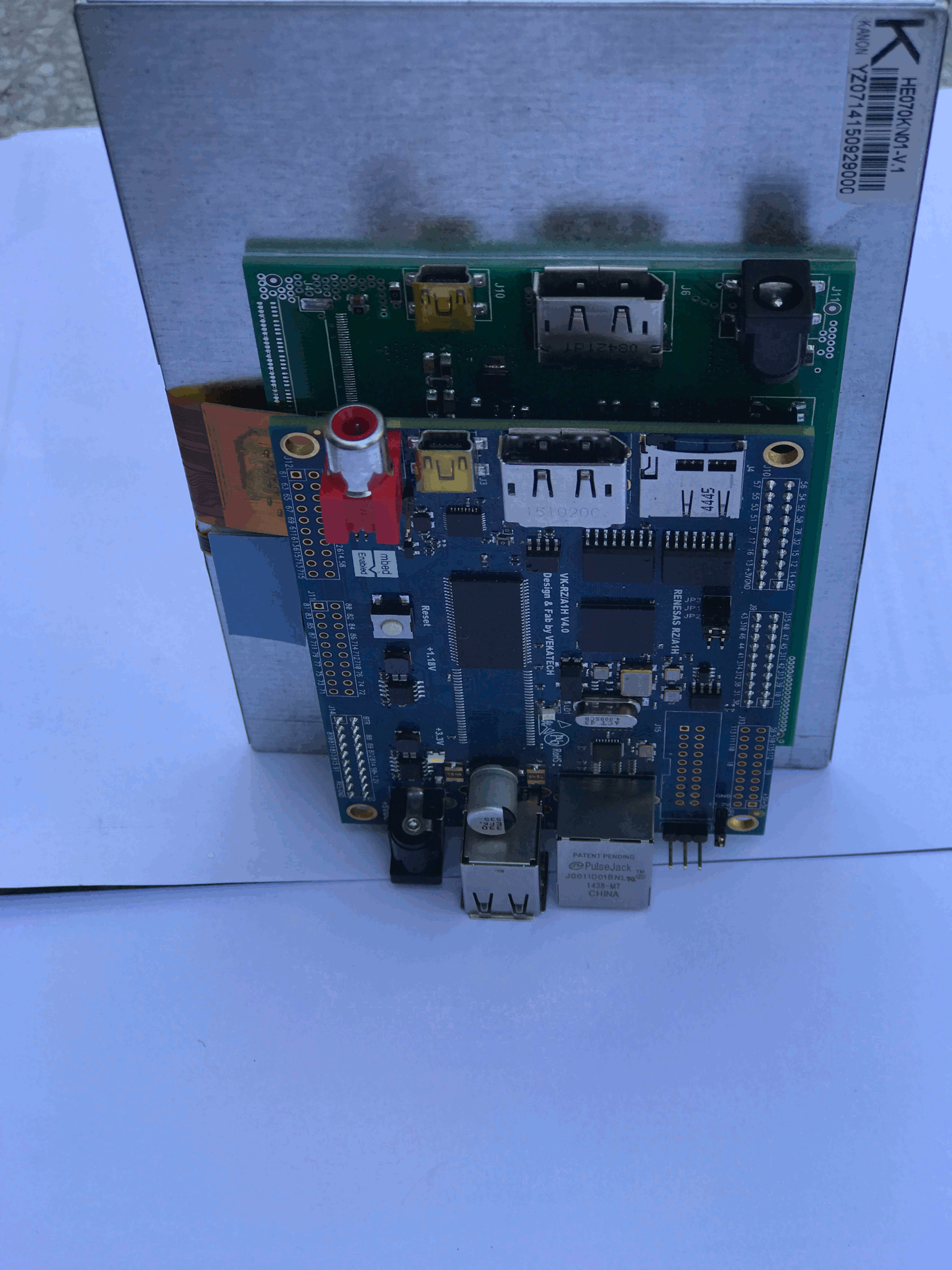
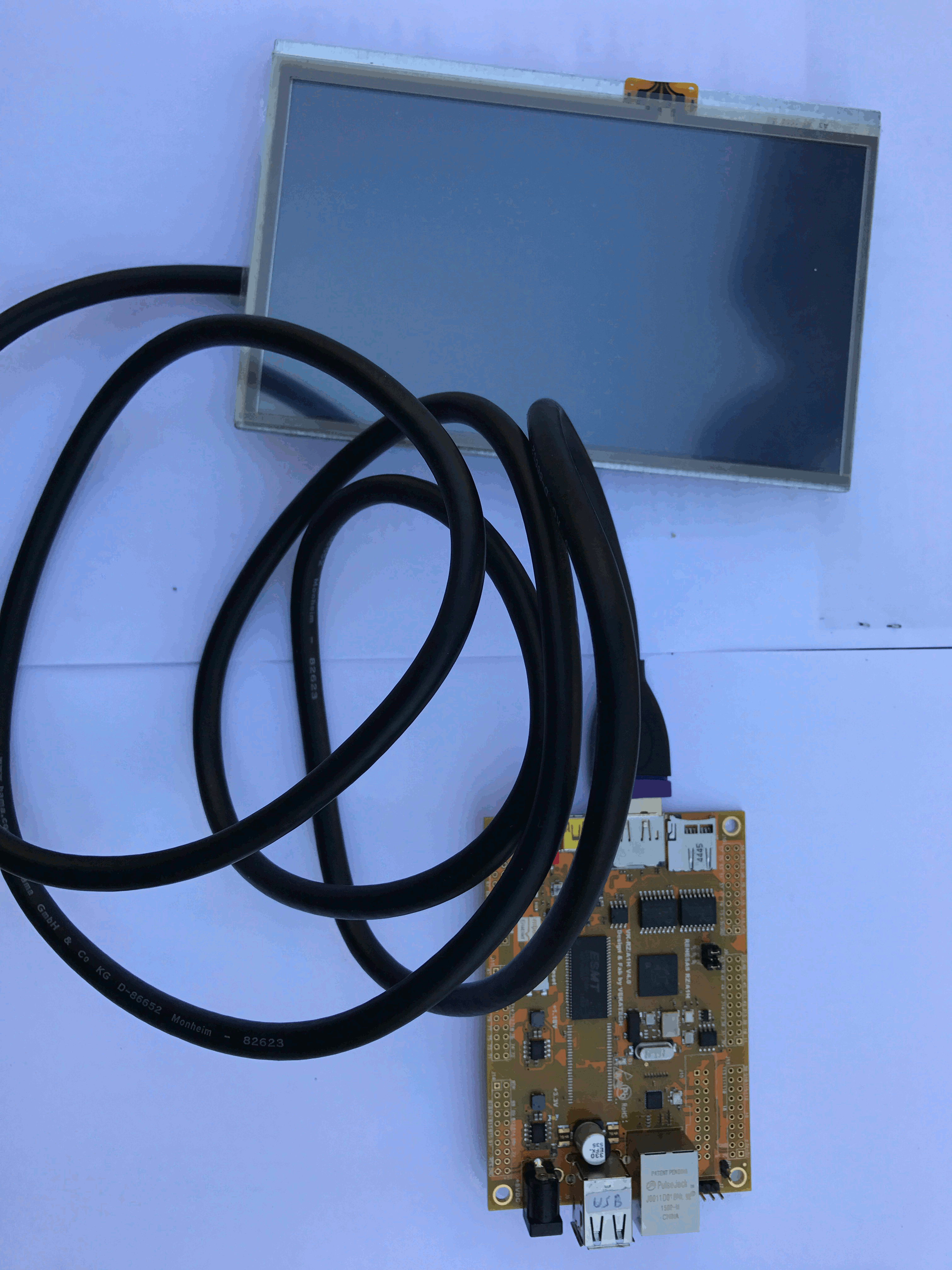
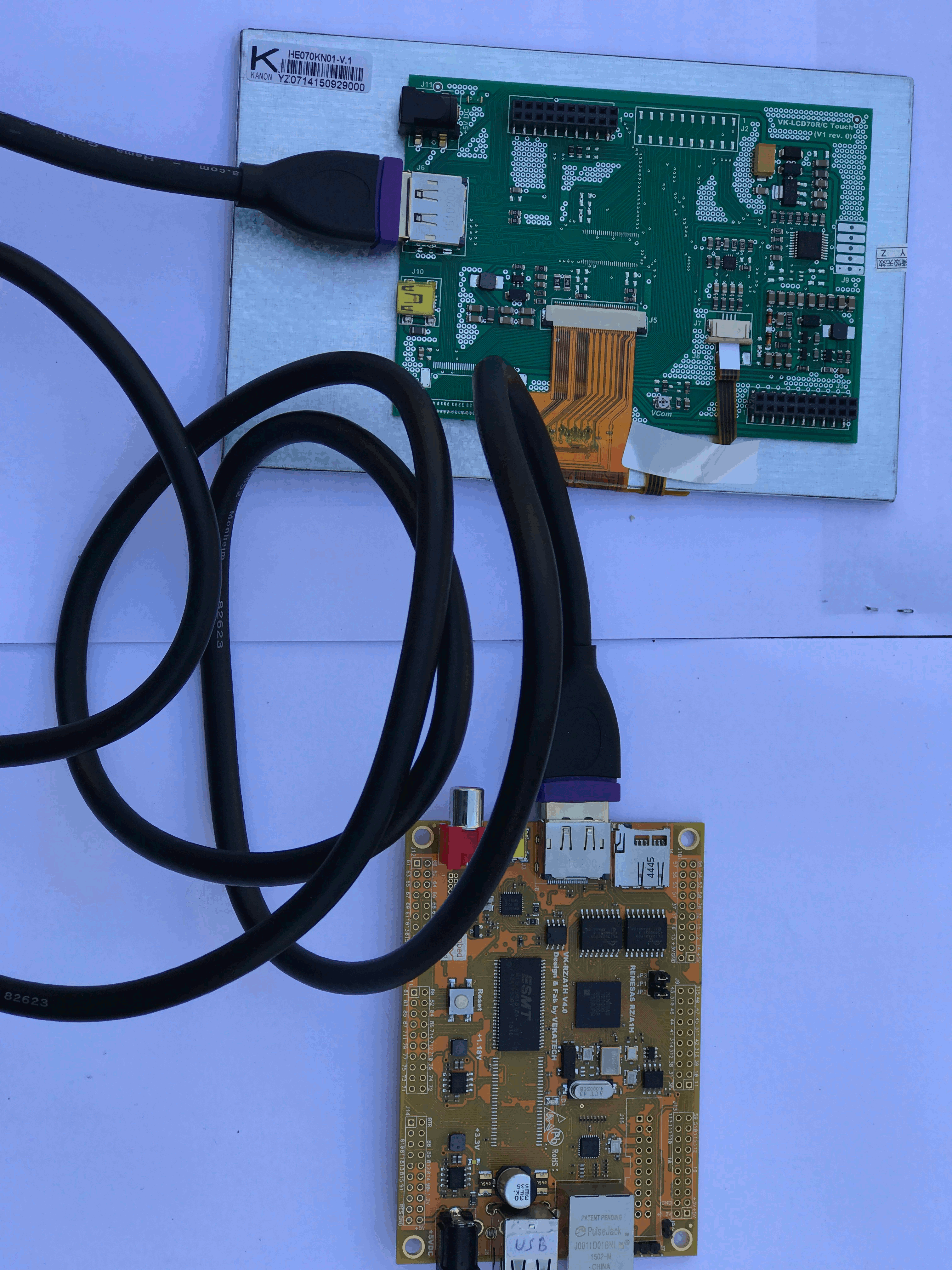
How to Configure ?
You can choose which display is installed by altering the lcd_panel.h file
Leave the active one & comment out the others:
#define LCD_VDC5_CH0_PANEL LCD_CH0_PANEL_VKLCD50RTA //#define LCD_VDC5_CH0_PANEL LCD_CH0_PANEL_VKLCD70RT
You can alter the whole demo with your pictures if you like:
How to compile ?
- The Demo can be compiled in 3 modes:
- I. Execution from the internal 10-MB on-chip SRAM.
- II. Execution from the on-board serial FALSH in dual (32-MB) mode.
- After import in the online compiler just leave only the VKRZA1H_DOUBLE.sct & delete all others linker files in the TOOLCHAIN_ARM_STD folder.
- Drag & drop the result binary in MBED disk, (previously inited in double flash mode)
- III. Execution from the on-board serial FALSH in single (16-MB) mode.
- After import in the online compiler just leave only the VKRZA1H_SINGLE.sct & delete all others linker files in the TOOLCHAIN_ARM_STD folder.
- Drag & drop the result binary in MBED disk, (previously inited in single flash mode )
Quick presentation:
Other demos ?
More demos you can find on our FTP
Diff: USB/uvc/jconfig.h
- Revision:
- 0:6435b67ad23c
diff -r 000000000000 -r 6435b67ad23c USB/uvc/jconfig.h --- /dev/null Thu Jan 01 00:00:00 1970 +0000 +++ b/USB/uvc/jconfig.h Thu Feb 16 10:23:48 2017 +0000 @@ -0,0 +1,164 @@ +/* + * jconfig.doc + * + * Copyright (C) 1991-1994, Thomas G. Lane. + * This file is part of the Independent JPEG Group's software. + * For conditions of distribution and use, see the accompanying README file. + * + * This file documents the configuration options that are required to + * customize the JPEG software for a particular system. + * + * The actual configuration options for a particular installation are stored + * in jconfig.h. On many machines, jconfig.h can be generated automatically + * or copied from one of the "canned" jconfig files that we supply. But if + * you need to generate a jconfig.h file by hand, this file tells you how. + * + * DO NOT EDIT THIS FILE --- IT WON'T ACCOMPLISH ANYTHING. + * EDIT A COPY NAMED JCONFIG.H. + */ + + +/* + * These symbols indicate the properties of your machine or compiler. + * #define the symbol if yes, #undef it if no. + */ + +/* Does your compiler support function prototypes? + * (If not, you also need to use ansi2knr, see install.doc) + */ +#define HAVE_PROTOTYPES + +/* Does your compiler support the declaration "unsigned char" ? + * How about "unsigned short" ? + */ +#define HAVE_UNSIGNED_CHAR +#define HAVE_UNSIGNED_SHORT + +/* Define "void" as "char" if your compiler doesn't know about type void. + * NOTE: be sure to define void such that "void *" represents the most general + * pointer type, e.g., that returned by malloc(). + */ +/* #define void char */ + +/* Define "const" as empty if your compiler doesn't know the "const" keyword. + */ +/* #define const */ + +/* Define this if an ordinary "char" type is unsigned. + * If you're not sure, leaving it undefined will work at some cost in speed. + * If you defined HAVE_UNSIGNED_CHAR then the speed difference is minimal. + */ +#undef CHAR_IS_UNSIGNED + +/* Define this if your system has an ANSI-conforming <stddef.h> file. + */ +#define HAVE_STDDEF_H + +/* Define this if your system has an ANSI-conforming <stdlib.h> file. + */ +#define HAVE_STDLIB_H + +/* Define this if your system has an FILE* type of <stdio.h>. + */ +/*#define HAVE_FILE_P_H*/ + +/* Define this if your system does not have an ANSI/SysV <string.h>, + * but does have a BSD-style <strings.h>. + */ +#undef NEED_BSD_STRINGS + +/* Define this if your system does not provide typedef size_t in any of the + * ANSI-standard places (stddef.h, stdlib.h, or stdio.h), but places it in + * <sys/types.h> instead. + */ +#undef NEED_SYS_TYPES_H + +/* For 80x86 machines, you need to define NEED_FAR_POINTERS, + * unless you are using a large-data memory model or 80386 flat-memory mode. + * On less brain-damaged CPUs this symbol must not be defined. + * (Defining this symbol causes large data structures to be referenced through + * "far" pointers and to be allocated with a special version of malloc.) + */ +#undef NEED_FAR_POINTERS + +/* Define this if your linker needs global names to be unique in less + * than the first 15 characters. + */ +#undef NEED_SHORT_EXTERNAL_NAMES + +/* Although a real ANSI C compiler can deal perfectly well with pointers to + * unspecified structures (see "incomplete types" in the spec), a few pre-ANSI + * and pseudo-ANSI compilers get confused. To keep one of these bozos happy, + * define INCOMPLETE_TYPES_BROKEN. This is not recommended unless you + * actually get "missing structure definition" warnings or errors while + * compiling the JPEG code. + */ +#undef INCOMPLETE_TYPES_BROKEN + + +/* + * The following options affect code selection within the JPEG library, + * but they don't need to be visible to applications using the library. + * To minimize application namespace pollution, the symbols won't be + * defined unless JPEG_INTERNALS has been defined. + */ + +#ifdef JPEG_INTERNALS + +/* Define this if your compiler implements ">>" on signed values as a logical + * (unsigned) shift; leave it undefined if ">>" is a signed (arithmetic) shift, + * which is the normal and rational definition. + */ +#undef RIGHT_SHIFT_IS_UNSIGNED + + +#endif /* JPEG_INTERNALS */ + + +/* + * The remaining options do not affect the JPEG library proper, + * but only the sample applications cjpeg/djpeg (see cjpeg.c, djpeg.c). + * Other applications can ignore these. + */ + +#ifdef JPEG_CJPEG_DJPEG + +/* These defines indicate which image (non-JPEG) file formats are allowed. */ + +#undef BMP_SUPPORTED /* BMP image file format */ +#undef GIF_SUPPORTED /* GIF image file format */ +#undef PPM_SUPPORTED /* PBMPLUS PPM/PGM image file format */ +#undef RLE_SUPPORTED /* Utah RLE image file format */ +#undef TARGA_SUPPORTED /* Targa image file format */ + +/* Define this if you want to name both input and output files on the command + * line, rather than using stdout and optionally stdin. You MUST do this if + * your system can't cope with binary I/O to stdin/stdout. See comments at + * head of cjpeg.c or djpeg.c. + */ +#undef TWO_FILE_COMMANDLINE + +/* Define this if your system needs explicit cleanup of temporary files. + * This is crucial under MS-DOS, where the temporary "files" may be areas + * of extended memory; on most other systems it's not as important. + */ +#undef NEED_SIGNAL_CATCHER + +/* By default, we open image files with fopen(...,"rb") or fopen(...,"wb"). + * This is necessary on systems that distinguish text files from binary files, + * and is harmless on most systems that don't. If you have one of the rare + * systems that complains about the "b" spec, define this symbol. + */ +#undef DONT_USE_B_MODE + +/* Define this if you want percent-done progress reports from cjpeg/djpeg. + */ +#undef PROGRESS_REPORT + +#endif /* JPEG_CJPEG_DJPEG */ + +#define JDCT_DEFAULT JDCT_IFAST +#define JDCT_FASTEST JDCT_IFAST +#define NO_ZERO_ROW_TEST +#include "r_multi_compiler_typedef.h" /* INLINE */ +